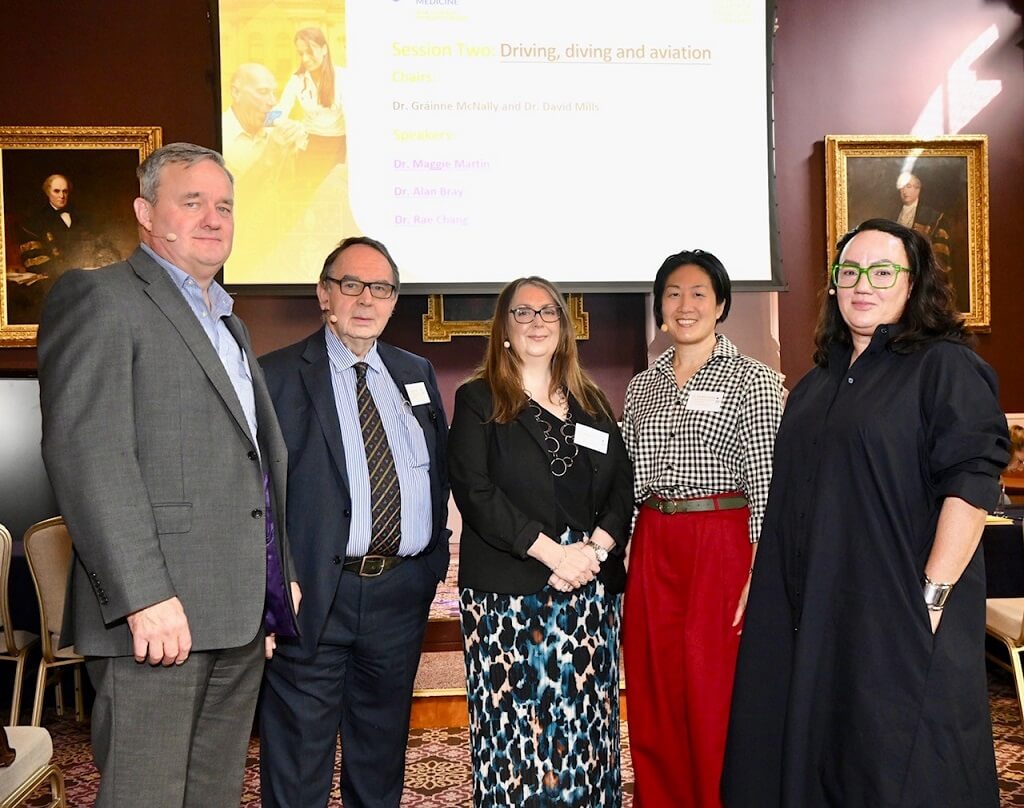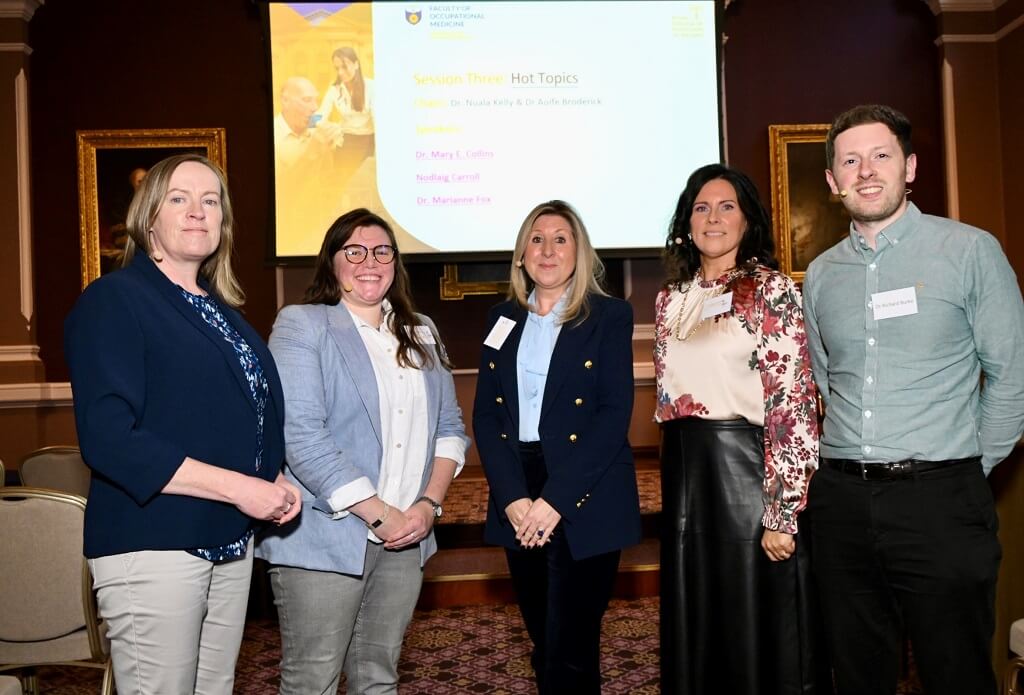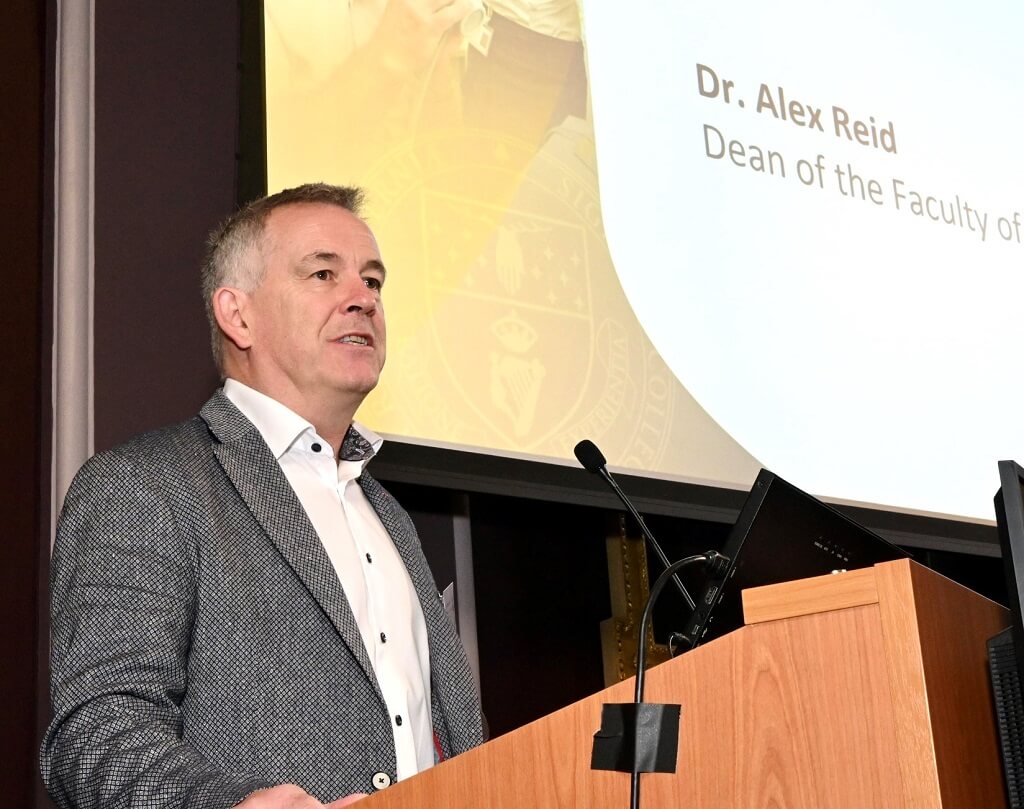Enhancing worker wellbeing: key insights from the Faculty of Occupational Medicine Autumn Conference
The Faculty of Occupational Medicine’s Autumn Conference, held on 26 September 2025, brought together professionals both in person and online to explore the evolving landscape of occupational medicine. With contributions from national and international experts, the day featured discussions on topics ranging from post-injury rehabilitation to workplace wellbeing, as well as the unique occupational health needs of sectors such as driving, diving and aviation.
Dr Alex Reid, Dean of the Faculty of Occupational Medicine, opened the conference before the first session began which focused on head and neck rehabilitation. This session explored the challenges faced by individuals returning to work following injury or treatment for head and neck cancer.
Ms Deirdre Leavy, Clinical Specialist Speech and Language Therapist, opened the session with a presentation on the complexities of head and neck cancer survivorship, highlighting challenges related to communication and swallowing functions as well as approaches to supporting those impacted.
Senior Occupational Therapist at the National Rehabilitation Hospital, Ms Fiona Ryan followed with an overview of the wide range of strategies and interventions used to support individuals returning to work post-injury. Dr Funmi Oluwajana, Consultant in Restorative Dentistry at the NHS Trust, concluded the session with an insightful talk on the complex rehabilitation needs of those recovering from head and neck cancer and the subsequent impact on their return to work.

The second session focused on occupational health considerations unique to high-risk industries such as driving, diving and aviation. Dr Maggie Martin, Cognitive Psychologist at the National Office for Traffic Medicine, provided an update on the latest developments in driving medicine.
Dr Alan Bray, Medical Director of SouthWest Independent Medical Services Ltd, followed with a session examining the medical challenges associated with diving and tunnelling, drawing on his experience from largescale tunnelling projects such as the Lower Thames Crossing and HS2 projects.
Dr Rae-Wen Chang, Consultant Occupational Physician and Aeromedical Examiner at NATS, concluded the session by highlighting the delicate balance required in aviation medicine when assessing aeromedical fitness with a particular focus on the fitness of air traffic controllers.

Following an interlude for lunch and networking, the final session of the conference focused on a range of hot topics in occupational medicine. Dr Mary E. Collins, Chartered Psychologist at the RCSI Centre for Positive Health Sciences, began the session with an engaging presentation on the importance of intergenerational teams in the workplace. Her talk, "Mind the Gap" highlighted how diverse age groups bring unique strengths to the workforce and how organisations can use these strengths to create more effective teams.
Dr Nodlaigh Carroll, Organisational Health Lead at the HSE, followed with an in-depth look at psychosocial risks in the workplace, exploring how factors such as stress, job demands, and team dynamics impact work environments. The session concluded with a presentation by Ms Marianne Fox, Occupational Psychologist at Lexxic, on neurodiversity in the workplace. Ms Fox discussed how organisations can create more inclusive environments for neurodiverse individuals, offering practical strategies to enhance support and improve workplace outcomes.
Throughout the conference, each session was rounded out by engaging panel discussions, where experts addressed attendee questions and reflected on how occupational medicine is evolving in response to emerging trends and challenges.
In his closing remarks, Dr Alex Reid emphasised that the day’s discussions were not only about the current state of occupational medicine but also about looking to the future of the profession and its role within the healthcare system. “Today, we explored how and where occupational medicine can best support society’s most vulnerable, assist those working in high-risk industries and address the benefits and challenges of the modern workplace,” he said.

Dr Reid thanked everyone who participated and contributed to the conference’s success and invited everyone to attend and continue the conversation at the faculty’s next event – the Annual Faculty of Occupational Medicine Smiley Lecture on Friday, 14 November 2025.
Image gallery